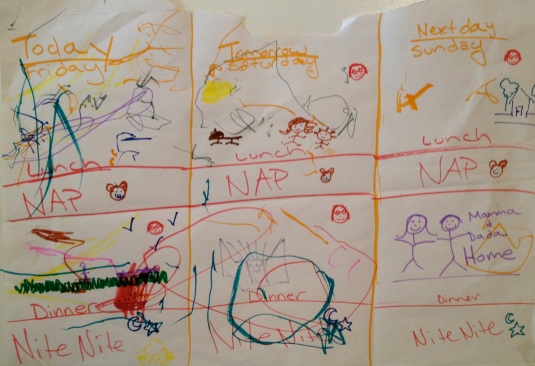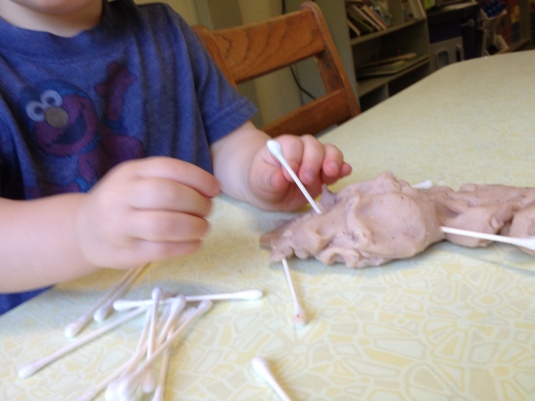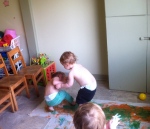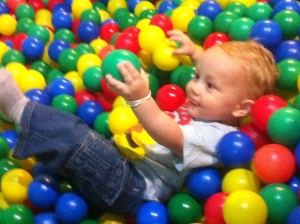 I have a hard time telling the truth. To my son. In my heart I want to be honest and clear with him. I want to help him to prepare for what is to come or to honestly express the emotions he is handling. When the going gets tough though I always find myself in an internal battle. The logical side of me trying to smack some sense into the emotional side.
I have a hard time telling the truth. To my son. In my heart I want to be honest and clear with him. I want to help him to prepare for what is to come or to honestly express the emotions he is handling. When the going gets tough though I always find myself in an internal battle. The logical side of me trying to smack some sense into the emotional side.
You see my emotional side still believes that I can protect him from all hurt. Isn’t that what we really all want to do anyway? Deep down every parent would love to make their child’s life an easy ride full of excitement, fulfilled promises and friendly interactions. We all know this isn’t life though. From the very beginning our tiny ones have to deal with life. They get shots, they must sit in that god awful contraption we call a car seat and they sometimes (gasp!) even have to wait to get their needs met while their mothers use the restroom!
No matter what my convictions are or how I may act to the contrary I promise you there is always a little voice inside my head begging me to sugar-coat a sad good-bye or other such childhood disappointment. For the most part I feel I am honest but today was a big test for me as a Mamma.
Today we went for Collin’s two-year-old check up. I knew for weeks now that this meant he needed one more vaccination. I also was keenly aware that our last appointment for a nasty cough had been a less than warm visit. With these two things in mind I decided that I would be honest and clear about what would happen. However, up until the moment we walked into the office I was trying to talk myself out of actually telling him he would get a shot before he got it.
I mean really who wants to know they are getting a shot before they get it, right? The anticipation is the worst part anyway isn’t it? (This is where I almost had myself convinced) BUT….and this is a BIG BUT….we ALWAYS know that a shot it coming. Yes thinking about it can be worrisome and produce anxiety, but what if someone took you into a room (someone you trusted) and out of NOWHERE someone just poked you with a needle? I would feel so betrayed and to be honest I wouldn’t be going anywhere with that person anywhere soon.
I had to look more closely at my motives. Why did I feel like sugar-coating the truth (and btw sugar-coating is a lovely word for lying isn’t it…)? Truth be told I was worried that telling him he was going to get a shot might make him freak out a bit. I was worried about having to deal with a full-blown toddler meltdown. Stating it out loud might make him more difficult to deal with. An oblivious toddler would surely be easier to ‘fake-out’ and get to cooperate than one who was in the know.
These were MY reasons for lying though and none of them benefited him in any way. He deserved to be prepared for all of it. He deserved to know what the nurse and the doctor were going to do. He deserved to know that he would get a shot and that it would hurt.
So I told him. Everything. (I did wait to talk about the shot until right before the injection nurse was due to come to the room though, in the hopes of reducing anxiety about the whole experience)
The other piece to this is the respect one must have to treat a child so young this way. There is an underlying belief that your child understands and internalizes what you say that must be present when speaking the truth. I can’t say I have always been completely honest or respectful during our short relationship but each day I am more conscious and I try harder. I am very aware that the words I use do matter. They matter very much. Sometimes I worry that when I speak the truth of what may be bothering him out loud I will cause a commotion. I will make things worse or bring on louder screams. But do you know what happens? Each and every time that I break through my own barriers and MAKE myself state what the real truth of his emotions are? He releases those feelings, moves through them and handles it. He may need to cry more or harder to do this. He may simply be thankful for the recognition and be able to move on. This truth telling is always cathartic and always moves us closer to a true resolution.
It was the same way in the Dr.’s office today. As we went through the steps that I had prepared him for he (and his Pooh bear) got weighed, measured and checked for any number of issues. He clung on to me a few times but easily relaxed as we discussed what was about to happen. He laid down for his shot, knowing he would feel a poke or a pinch. Of course he cried but he was done in less than a minute. He wiped his eyes, we talked about how he body was stronger now. I asked if he wanted to go and he smiled “Yes!” and we walked off talking about what happened.
Both of us full of love and trust in each other and our ability to face the world as a team.
How do you grow mutual respect? How do we stay honest yet speak in a developmentally appropriate way?
I’d love to hear your thoughts!
As always, thanks for reading and T.G.I.F.!
Melissa




















